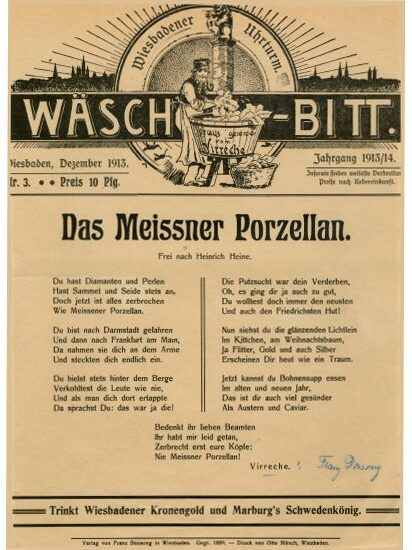Wäsch-Bitt
The satirical newspaper "Wäsch-Bitt", published by Franz Bossong, commented on Wiesbaden's heyday as a spa town. From the perspective of the established bourgeoisie, it took a stand on issues of the time in political, satirical or entertaining articles.
The Wäsch-Bitt (High German: Waschtrog) was initially published as a satirical newspaper in three volumes from 1897 to 1900 by Franz Bossong 's publishing house in Wiesbaden, with the first issue appearing in January 1897. In the subtitle, Bossong called his newspaper "E' Fach-, Lach- und Krach-Blättche". The 25 issues of the newspaper - eight in the first, five in the second and twelve in the third year - appeared "in casual succession". The issues of the third year almost all have a second page. Some of the issues, in particular No. 1 (January) and No. 2 (February) of 1898, contain carnival lectures. The other issues published throughout the year mostly contained satirical, political or entertaining articles, some in prose, some in rhyme, some in dialect and some in High German.
Franz Bossong wrote most of the articles himself and selected and edited the others. From No. 6, 1897, it was printed in its own print shop at Mauritiusstraße 8, and from No. 9, 1899, in Bertramstraße. The political-satirical and political contributions - above all the March number of 1898, dedicated to the commemoration of the 1848 revolution - are reminiscent of role models, e.g. the Frankfurt "Latern" by Wilhelm Stoltze. After returning to Wiesbaden from his ten-year stay in Paris (1899 -1909), Franz Bossong resumed his local journalistic activities and published further issues of the Wäsch-Bitt until February 1914.
The Wäsch-Bitt commented on Wiesbaden's heyday shortly before the turn of the century as a spa town, as the May residence of Kaiser Wilhelm II, as a residential town for the moneyed aristocracy of the empire from the perspective of the established bourgeoisie. The rich and powerful who moved in under Prussian rule had pushed back the original Nassau element, which had been strengthened since the founding of the Duchy of Nassau, and gave the town the Wilhelmine character that still exists today. Many of the established citizens took part in the transformation of the city and benefited from the general upswing. At the same time, they were threatened with relegation in the social hierarchy and had to fear for their influence on the city's development, while their share of the costs was secure. The sudden wealth that flooded the city also aroused mistrust and had a threatening effect on the locals, as it destroyed their familiar surroundings. Wäsch-Bitt represents the side of the liberal citizen against the Prussian-militaristic "soldier state" with humor and satire, but also with feeling and perspicacity.
Literature
- Bossong, Franz
Wäsch-Bitt. E' Fach-, Lach-, unn Krach-Blättche, Jahrgang 1897, 1898, 1899.
- Forßbohm, Brigitte
The Wäsch-Bitt by Franz Bossong. Hilarious and satirical stories from old Wiesbaden 1897-1900, Wiesbaden 1998.
